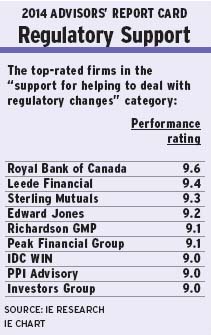
Adapting a financial advisory business in order to comply with the various and constant changes taking place in the regulatory environment can be a trying task for many financial advisors. But an advisor’s firm can provide a lot of support in this area – and many have not taken this task lightly.
This attitude is particularly relevant, given the various regulatory changes that have come into effect this summer – including the changes that are part of the second phase of the client relationship model (CRM2) and the implementation of the Canada’s anti-spam law.
Thus, Investment Executive introduced the “support for helping to deal with changes in the regulatory environment” category for the entire Report Card series this year. The result: advisors gave their firms an overall average performance rating of 8.5 in the category while giving the category an overall average importance rating of 9.0. These numbers indicate that this support matters greatly to advisors and that, for the most part, their firms are delivering.
Firms of all stripes – whether they be brokerages, mutual fund dealers, banks, credit unions or insurance agencies – have provided advisors with the support they need in the form of education, whether that be through emails, documentation or training sessions such as in-person meetings, webinars or online courses.
“[The bank] trains and supports us,” says an advisor in Ontario with Toronto-based Royal Bank of Canada (RBC), which received the highest performance rating in this category (9.6) among all the firms in this year’s Report Card series.
“We did a series of videos for employees about CRM2 and held several conferences [on the matter] over the past two years. We also have consultants who will, on request, attend team meetings,” says Michael Walker, vice president and head of branch investments with RBC, who adds that the bank even provides videos that advisors can share with their clients to explain the regulatory changes taking place.
“We constantly have emails and training programs,” says an advisor in British Columbia with Calgary-based Leede Financial Markets Inc., which received the second-highest rating in the category, at 9.4.
Robert Harrison, Leede’s president and CEO, says keeping advisors informed and trained on upcoming regulatory changes is critical in supporting advisors: “As we put in new guidelines and rules, we’re sending them out to everybody on an ongoing basis.”
Advisors with Mississauga, Ont.-based Edward Jones also rated their firm strongly for its support in this category (9.2) for its efforts to keep advisors abreast of the regulatory changes and their implications.
“To do the best we can for clients and also to help us deal with the challenges we face,” says an Edward Jones advisor in Ontario, “our firm lets us know how [regulatory changes] will affect clients and our business.”
David Lane, principal and head of Canadian operations with Edward Jones, says that the firm’s “senior management has gone out to every single region, talked about the upcoming changes: how they can really benefit our firm and benefit our clients, and what steps we’re taking and the timeline [for doing so].”
Advisors also were keen to point out that although being informed about coming regulatory changes is very important, the timing is just as critical.
“[The firm] is on top of regulatory changes way ahead of schedule,” says an RBC advisor in Alberta.
Adds an Edward Jones advisor in Ontario: “This [educational process] has been ongoing since last summer. We were all advised and we are all clear on coming changes and how we need to shift now to mitigate issues.”
“They’re always right on the ball,” notes an advisor in B.C. with Vancouver-based Canaccord Genuity Wealth Management. “The new rules for disclosures have to be done in two years. Well, we’re doing them this summer.”
Meanwhile, some advisors said they appreciate that their firms are involved throughout the process of regulatory change, in that their firm lobbies and works with the regulators as new rules are being developed.
“From the board level down to compliance, we are very proactive,” says a Leede advisor in B.C. “Senior management is on a ton of committees.”
“We’re involved with the regulators,” says an Edward Jones advisor on the Prairies. “We have people who volunteer to help with regulation.”
This involvement is an important component of management’s work, says Jim Burton, chairman and CEO of Toronto-based PPI Advisory: “We’ve taken a leadership position in the industry, both through the Conference for Advanced Life Underwriting and through Advocis, in working to advance the interests of agents on the regulatory front.”
Although advisors, for the most part, praised their firms for their support in this category, others were less than impressed. In fact, some advisors pointed out that they were not even aware that there were any regulatory changes taking place; other advisors noted that their firms were not providing enough information.
“There hasn’t been much communication on it,” says an advisor in Ontario with Toronto-based ScotiaMcLeod Inc. “Frankly, I’ve had more help from the third-party groups I deal with than from my own firm.”
Meanwhile, other advisors said that although their firms have made an effort to let them know that the regulatory changes are on the way, the support itself is sorely lacking.
“There is a difference,” says an advisor in Ontario with London, Ont.-based Freedom 55 Financial, “between notifying and helping me deal with the situation.”
© 2014 Investment Executive. All rights reserved.